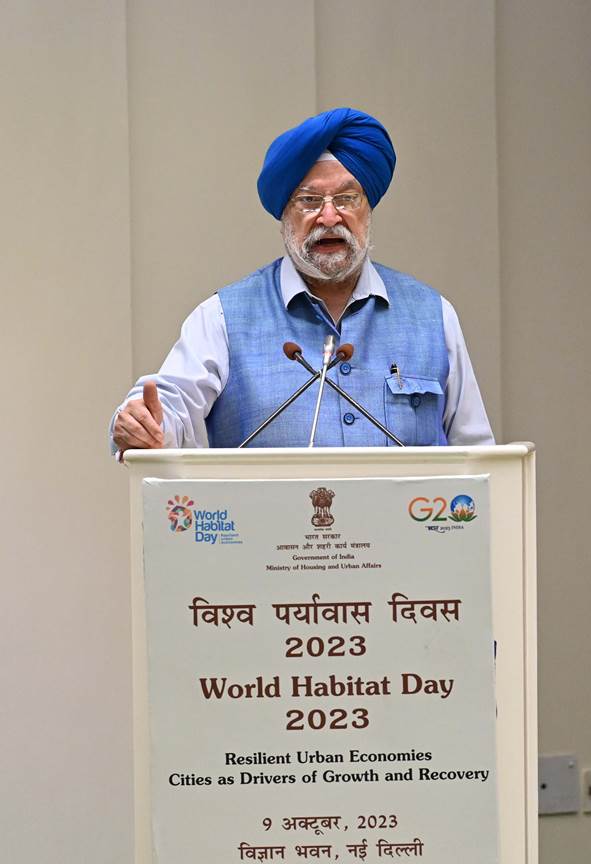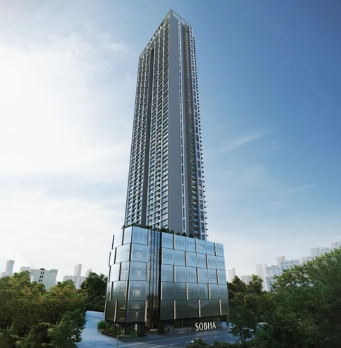By Staff Reporter
Addressing the gathering at World Habitat Day (WHD) 2023, Shri Hardeep Singh Puri, Minister of Housing & Urban Affairs and Petroleum and Natural said , significance of World Habitat Day is increasingly being understood now. Recalling the conceptualisation of WHD in 1980s, he said that the concept of the World Habitat Day was first introduced in 1986 in Nairobi, Kenya. The theme of the first celebration of the World Habitat Day was ‘Shelter is my Right’, underlining the most acute problem of 1986 – that of adequate shelter in cities. Since then, the Minister said that the discourse around human settlements has evolved. In the next few years, the annual themes varied to reflect the priorities of the time – from safety to women’s empowerment, and from sanitation to dignity of work.
The approach towards development has also evolved through Millennium Development Goals and Sustainable Development Goals. SDGs are designed from citizen centric perspective and focus more on inclusive and bottom-up approach.
Talking the evolution of urban spaces in India, the Minister said that the focus of Government on Urban Transformation has increased considerably. There was neglect in urban development before 2014. Only Rs. 1.78 lakh crores were invested in urban areas between 2004 to 2014. Under the farsighted leadership of the Prime Minister Shri Narendra Modi, he said this has changed. “More than Rs. 18 lakh crores have been invested since 2014 in the transformation of our cities and towns”, he emphasised.
He said that in 2014, the amount of urban waste processing was around 17 percent and now it has increased to 76 percent. He expressed confidence that in the coming time, the urban waste processing will reach to 100 percent. The huge legacy dumpsites in urban areas will aslo be removed through bioremediation in next 2 years, he added further.
Shri Puri said that this year’s theme ‘Resilient urban economies: Cities as drivers of growth and recovery’ is aptly chosen. A discussion on this subject assumes greater significance now as the world enjoys its first year without the disruption of the pandemic. This theme underscores the role of cities as the epicentres of economic recovery and growth in the post-pandemic global order, he said.
Speaking on the sustainable growth of urban spaces, the Minister said that the element of sustainability is incorporated in urban transport and other policy matters related to urban development. He mentioned about the green alternatives such as electric vehicles that are being promoted to fill the vacuum in the urban transport.
He said that a country’s economic growth can be measured from its energy consumption and from its urban landscape as well. Across the world, he said that urban areas are the productive hubs of economies, with more than 75 percent of the world’s GDP generated here. “In India, despite the relatively low urbanisation, cities already contribute 66 percent to the national GDP”, he said. This number is expected to go as high as 80 percent by 2050 when more than half of the country’s population resides in its urban areas. This year’s theme focuses on future-proofing urban economies to make them better prepared to handle black swan events, pandemics and other such catastrophic events, he added.
The Minister urged the cities to use innovative ways such as municipal bonds for raising the finacial resources. Complimenting the cities for raising for using municipal bonds to raise resources, he said through the AMRUT mission, the government has pressed for cities to go to the markets to raise capital investment. 12 cities have raised more than Rs. 4,384 crores through municipal bonds. Such actions have increased ULB creditworthiness and made them attractive investment destinations.
Talking about the India’s model of planned urbanisation, the Minister said that underpinned by a focus on Antyodaya Se Sarvodaya has ensured that our cities remain vibrant and economically thriving in turbulent times. There is much that other countries can learn from the manner in which we have operationalised large-scale programmes and brought about green transition in our cities, he said.
About World Habitat Day:
Each year, World Habitat Day is held on the first Monday of October and launches Urban October globally. The day centres around the global observance, which is held in a different country each year with keynote speakers and roundtable discussions focused on a specific theme. World Habitat Day was first celebrated in 1986 in Nairobi, Kenya, with the theme ‘Shelter is my right’.
This year’s Global Observance of World Habitat Day under the theme of “Resilient urban economies. Cities as drivers of growth and recovery.” looked at how cities can position their economies to benefit residents. Aligning with the theme, the Ministry of Housing and Urban Affairs, Government of India, hosted an event at Vigyan Bhawan today i.e. on 9th October 2023. Shri Hardeep Singh Puri, Minister of Housing & Urban Affairs, Mr. Shombi Sharp, UN Resident Coordinator, and Shri Manoj Joshi, Secretary, MoHUA attended the event. The focus of the event was to convene various urban stakeholders to discuss ways in which cities can be primed to address economic and environmental challenges to achieve the 2030 Agenda for Sustainable Development.




